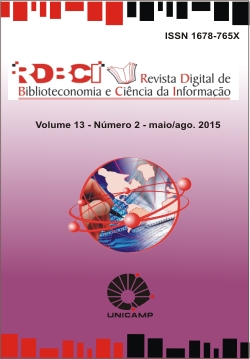Abstract
The information and communication technologies is remodeling the processes of human interaction, making them more effective and accelerated. In this article, the crowdsourcing is presented as search method. To it, presents a brief theoretical foundation about the scientific production and methodology consequent of the influence of technology. This article have not the pretension to propose a method with crowdsourcing’s characteristics, but yes introduce a needed discussion about cognitive surplus that is not use in the scientific field yet to present this technique as scientific method.
References
ALISSON, Elton. Interatividade da internet mudou a forma de comunicar ciência. Publicado em: 09 maio 2014. Disponível em: < http://agencia.fapesp.br/19049>. Acesso em: 12 jun. 2014.
ALZAMORA, Geane; ZILLER, Joana. A dinâmica associativa das mídias sociais: semiose e convergência. Teccogs, dossiê, n. 8, jun.-dez. 2013. Disponível em: < http://www4.pucsp.br/pos/tidd/teccogs/dossies/2013/edicao_8/2-dinamica_associativa_midias_sociais-semiose_convergencia.pdf>. Acesso em: 12 jun. 2014.
AROLAS, Enrique Estellés; GUEVARA, Fernando González Ladrón de. Towards an integrated crowdsourcing definiton. Journal of Information Science, vol. 38, no. 2, April 2012. Disponível em: < http://jis.sagepub.com/content/38/2/189.short?rss=1&ssource=mfr>. Acesso em: 11 jun. 2014.
BURKE, Peter. Uma história social do conhecimento: da enciclopédia à Wikipedia. Rio de Janeiro: Zahar, 2012.
CASTELLS, Manual. A sociedade em rede: volume 1. São Paulo: Paz e Terra, 2010.
CORRÊA, Cynthia Harumy Watanabe. Comunidades virtuais gerando identidades na sociedade em rede. Ciberlegenda, n. 13, 2004. Disponível em: < http://www.uff.br/ciberlegenda/ojs/index.php/revista/article/view/226>. Acesso em: 09 jun. 2014.
DIAS, Adelaide. Definição de sociedade em rede. Publicado em: 25 fev. 2013. Disponível em: < http://pt.slideshare.net/adelaidedias9/definio-de-sociedade-em-rede>. Acesso em: 09 jun. 2014.
GENGO. Site. Disponível em: < http://gengo.com/>. Acesso em: 11 jun. 2014.
GETSATISFACTION. Site. Disponível em: < https://getsatisfaction.com/corp/>. Acesso em: 11 jun. 2014.
GIARDELLI, Gil. Você é o que você compartilha: e-agora: como aproveitar as oportunidades de vida e trabalho na sociedade em rede. São Paulo: Gente, 2012.
HOWE, Jeffrey. The rise of crowdsourcing. Publicado em jun. 2006. Disponível em: < http://archive.wired.com/wired/archive/14.06/crowds.html?pg=1&topic=crowds&topic_set=>. Acesso em: 10 jun. 2014.
INC. 6 cool crowdsourcing business tools. Publicado em [20??]. Disponível em: < http://www.inc.com/ss/how-use-crowdsourcing-business#0>. Acesso em: 11 jun. 2014.
ISRAEL, Shel. A era do Twitter: como a ferramenta de mídia colaborativa mais dinâmica da atualidade pode revolucionar seus negócios. Rio de Janeiro: Elsevier, 2010.
KICKSTARTER. Site. Disponível em: < https://www.kickstarter.com/>. Acesso em: 11 jun. 2014.
LAKATOS, Eva Maria; MARCONI, Marina de Andrade. Fundamentos de metodologia científica. 7. ed. São Paulo: Atlas, 2010.
OLIVEIRA, Vivian. O crowdsourcing à frente da mídia colaborativa e democrática: uma perspectiva cidadã para a web 2.0. Publicado em 2012. Disponível em: < http://www.unicentro.br/redemc/2012/artigos/34.pdf>. Acesso em: 11 jun. 2014.
PISANI, Francis; PIOTET, Dominique. Como a web transforma o mundo: a alquimia das multidões. São Paulo: Senac, 2010.
PROFICIÊNCIA. História do método científico. Disponível em: < http://www.proficiencia.org.br/article.php3?id_article=489>. Acesso em: 07 jun. 2014.
QUORA. Site. Disponível em: < https://www.quora.com/>. Acesso em: 11 jun. 2014.
SELTZER, Ethan; MAHMOUDI, Dillon. Citizen participation, open innovation and crowdsourcing: challenges and opportunities for planning. Journal of Planning Literature, vol. 28, n. 1, February 2013. Disponível em: < http://jpl.sagepub.com/content/28/1/3.full.pdf+html>. Acesso em: 10 jun. 2014.
SHIRKY, Clay. A cultura da participação: criatividade e generosidade no mundo conectado. Rio de Janeiro: Zahar, 2011.
SILVA, Edima Aranha. Evolução histórica do método científico: desafios e paradigmas para o século XXI. Econ. Pesqui., Araçatuba, v. 3, n. 3, mar. 2001. Disponível em: < http://www.feata.edu.br/downloads/revistas/economiaepesquisa/v3_artigo07_evolucao.pdf>. Acesso em: 12 jun. 2014.
SILVA, Tarcízio. Monitoramento de mídias sociais. In: ________. Para entender o monitoramento de mídias sociais. [Ebook] publicado em 2012. Disponível em: < http://tarciziosilva.com.br/blog/entenda-o-monitoramento-de-midias-sociais-com-e-book-brasileiro/>. Acesso em: 12 jun. 2014.
VICENTE, Renato. Método científico. Publicado em 2008. Disponível em: < http://www.ime.usp.br/~rvicente/MetodoCientifico.pdf>. Acesso em: 07 jun. 2014.
WAGORN, Paul. The problems with crowdsourcing and how to fix them. Publicado em: 08 abr. 2014. Disponível em: < http://www.ideaconnection.com/blog/2014/04/how-to-fix-crowdsourcing/>. Acesso em: 12 jun. 2014.
WEINBERGER, David. A nova desordem digital: os novos princípios que estão reinventando os negócios, a educação, a política, a ciência e a cultura. Rio de Janeiro: Elsevier, 2007.
WIKIPEDIA. História da Wikipedia. Editado em 23 maio 2014. Disponível em: < http://pt.wikipedia.org/wiki/Hist%C3%B3ria_da_Wikip%C3%A9dia>. Acesso em: 09 jun. 2014.

RDBCI: Revista Digital de Biblitoeconomia e Ciência da Informação / Digital Journal of Library and Information Science uses the Creative Commons (CC) license, thus preserving the integrity of articles in an open access environment, in which:
- This publication reserves the right to modify the original, regarding norms, spelling and grammar, in order to maintain the standards of the language, still respecting author writing style;
- The original documents will not be returned to the authors;
- Published works become Revista Digital de Biblitoeconomia e Ciência da Informação / Digital Journal of Library and Information Science's property, their second partial or full print being subject to expressed authorization by RDBCI's editor;
- The original source of publicaton must be provided at all times;
- The authors are solely responsible fo the views expressed within the document.





